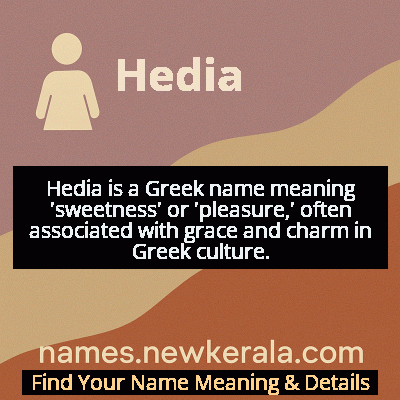Hedia Name Meaning & Details
Origin, Popularity, Numerology Analysis & Name Meaning of Hedia
Discover the origin, meaning, and cultural significance of the name HEDIA. Delve into its historical roots and explore the lasting impact it has had on communities and traditions.
Name
Hedia
Gender
Female
Origin
Greek
Lucky Number
9
Meaning of the Name - Hedia
Hedia is a Greek name meaning 'sweetness' or 'pleasure,' often associated with grace and charm in Greek culture.
Hedia - Complete Numerology Analysis
Your Numerology Number
Based on Pythagorean Numerology System
Ruling Planet
Mars
Positive Nature
Generous, passionate, energetic, and humanitarian.
Negative Traits
Impulsive, impatient, moody, and can be overly emotional.
Lucky Colours
Red, maroon, scarlet.
Lucky Days
Tuesday.
Lucky Stones
Red coral, garnet.
Harmony Numbers
1, 2, 3, 6.
Best Suited Professions
Military, sports, philanthropy, leadership roles.
What People Like About You
Courage, energy, leadership, generosity.
Famous People Named Hedia
Hedia Djerbi
Actress
Prominent figure in Tunisian cinema and television
Hedia Chaker
Politician
Member of the Assembly of the Representatives of the People
Hedia Baraket
Journalist
Notable Tunisian journalist and women's rights advocate
Name Variations & International Equivalents
Click on blue names to explore their detailed meanings. Gray names with will be available soon.
Cultural & Historical Significance
Extended Personality Analysis
People named Hedia typically exhibit a remarkable blend of social grace and emotional depth that makes them particularly effective in roles requiring diplomacy and interpersonal skills. Their pleasant nature is not merely superficial politeness but stems from a genuine interest in others' wellbeing and a deep-seated desire for harmonious relationships. Hedias often possess strong intuitive abilities, allowing them to read social situations accurately and respond with appropriate warmth and understanding. They tend to be natural mediators who can diffuse tension and bring opposing parties together through their calm demeanor and fair-minded approach. While they value peace and harmony, Hedias are not pushovers; they often demonstrate quiet strength and determination when principles are at stake. Their pleasant exterior often conceals a sharp intellect and observational skills that make them excellent judges of character and situations. This combination of social intelligence, emotional awareness, and principled strength makes individuals named Hedia particularly valued in their personal and professional relationships.
Modern Usage & Popularity
In contemporary naming practices, Hedia occupies a unique position as a name that bridges traditional heritage with modern sensibilities. While it hasn't experienced the dramatic popularity surges of some names, it maintains a steady presence in Mediterranean and North African communities, particularly in Tunisia where it's considered both classic and contemporary. The name's appeal in modern times lies in its international sound, positive meaning, and cultural versatility. Among diaspora communities in Europe and North America, Hedia serves as a meaningful connection to cultural roots while being accessible to multicultural environments. Recent trends show increased interest in names with positive meanings and cross-cultural adaptability, positioning Hedia well for potential growth. The name's moderate usage ensures it remains distinctive without being unfamiliar, making it an attractive choice for parents seeking a name that balances tradition with individuality. Digital globalization has also increased awareness of the name beyond its traditional regions, contributing to its gradual internationalization.
Symbolic & Spiritual Meanings
The symbolic resonance of Hedia extends far beyond its literal meaning of 'pleasant,' representing profound philosophical concepts about the nature of human interaction and cultural harmony. Symbolically, Hedia embodies the ancient Greek concept of 'kalokagathia' - the unity of beauty and goodness - suggesting that true pleasantness arises from moral integrity and inner beauty. The name metaphorically represents the Mediterranean itself: a meeting point of cultures, a bridge between continents, and a symbol of peaceful coexistence. It signifies the gentle power of diplomacy over force, the strength found in emotional intelligence, and the transformative potential of genuine pleasantness in human relationships. Hedia symbolizes the idea that cultural differences can be harmoniously blended, much like the diverse influences that have shaped Mediterranean civilizations throughout history. In a broader sense, the name represents the universal human yearning for harmony - both within oneself and in relationship with others - making it a powerful symbolic choice for our increasingly interconnected global community.

